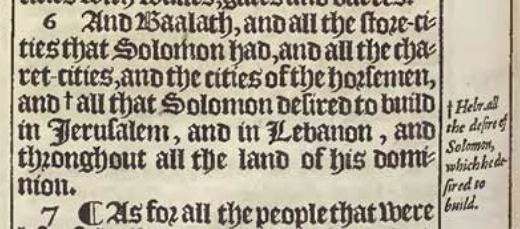GuySmiley
Well-known member
Will said we need to consult the Greek and Hebrew. I like Paul better.Paul tells us how to get understanding.
2 Timothy 2:7 KJV
Will said we need to consult the Greek and Hebrew. I like Paul better.Paul tells us how to get understanding.
2 Timothy 2:7 KJV
Hello GO! That's 2 Chronicles 8:6...

The phrase in the Hebrew that is not translated is the equivalent of "which he desired". God created human language, and just as there is no such thing as a square circle, God shows Himself completely aware that there is no such thing as an exact translation of any lengthy text into another language.
So as you are pointing out, the 1611 translators are giving the reader the courtesy of having more information so that they can make their own minds up about the nuances in the difference between the Hebrew and their translation.
- Bob
Good for you.Funny, I pick up my Bible with the attitude that it is God's word and believe it is so before I even read a word of it.
So do Bob and Will Duffy. Where does that leave the rest of us, needing a Rabbi, a sage or a so called scholar?Will said we need to consult the Greek and Hebrew.
Yes. And further, seems like, even if there was a perfect printed version, then men would definitely worship it. After all, some already idolize it (even after admitting it has some errors).
Thanks mamatuzzo! - Bob
Judges 8:27 27 And Gideon made an ephod thereof, and put it in his city, even in Ophrah: and all Israel went thither a whoring after it: which thing became a snare unto Gideon, and to his house. |
Why don't you be honest with yourself for a change and admit that you do not believe there is now or ever has been such a thing as a complete and inerrant Bible in any language, translated or untranslated, and be done with it?Why not just be HONEST about it, and admit that you do not believe there is now or ever has been such a thing as a complete and inerrant Bible in any language, translated or untranslated, and be done with it?
Please show me what these verses say in the NIV. Thanks!Good for you.
I do that with the KJV, the NASB, the NIV, the CJB, the YLT and more.
it is more than minor printing errors
there are actual translation errors
So, where does the margin note mention rare animals and precious stones?The marginal note is real simple to explain. The KJB says: "...and all that Solomon desired to build in Jerusalem, and in Lebanon, and throughout all the land of his dominion."
The marginal note shows the literal and redundant sense of the Hebrew - "Heb. all the desire of Solomon which he desired to build."
The meaning of the KJB English text is the same meaning as that found in the "literal" Hebrew. There is nothing to "investigate" or argue over. The sense of the passage is crystal clear and the English translation accurately conveys that meaning.
Hi C. Since you are a Vatican Version user (St. Joseph NAB) and an unbeliever in the existence of an inerrant Bible in any language, it would be interesting to see how your mind works (or, doesn't) when you affirm that the KJB has "translation errors".
So, why don't you give us your Number One All Time Big Hits "translation error" you think you have found in the KJB and prove that it is wrong. By the way, what is this absolute Standard you consult when you look at and compare the King James Bible?
Don't give me your bible agnostic laundry lists. Just your best shot example and we can then see if you are right or the Book is right and you are wrong.
Thanks.
Please show me what these verses say in the NIV. Thanks!
You can also pick up a NIV, a CJB, or a NASB Bible in any bookstore and you will have the inerrant words of God as well.Guy. Just get yourself a copy of a Cambridge printing of the King James Bible you can buy in any bookstore and you will have the inerrant words of God.
I see you do not really pick up a Bible with the attitude that it is God's word and believe it is so before you even read a word of it.
Funny, I pick up my Bible with the attitude that it is God's word and believe it is so before I even read a word of it.
You can also pick up a NIV, a CJB, or a NASB Bible in any bookstore and you will have the inerrant words of God as well.
I see that you do not believe in God's word.I happen to believe the NIV is a corrupted word of God.
I believe these verses, but they are not in your "God's word" of the NIV (or they're missing important details 1 John 5:7 NIV).I see that you do not believe in God's word.
After all, some already idolize it (even after admitting it has some errors).
heir won't even tell us which KJB she uses.
I think it is man made
